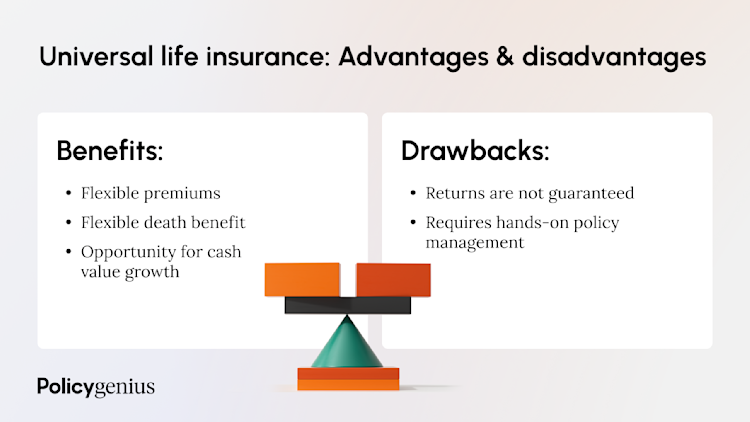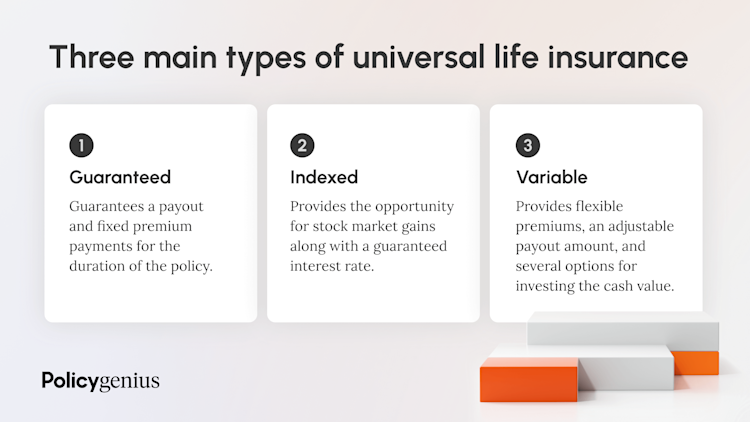Universal life insurance (UL) is a type of permanent life insurance policy that doesn’t expire as long as you pay your premiums and comes with a cash value component. It’s different from other popular permanent options, like whole life insurance, because it allows you to increase or decrease how much you pay toward premiums — and you may even cover those payments using the policy’s cash value.
Some UL policies may also allow you to adjust the death benefit on your policy. On the other hand, you need to keep an eye on the performance of your cash value. If it decreases to a point where you don’t have enough funds to cover your premiums, your policy may lapse — in other words, it may be canceled and you’ll lose coverage.
How does universal life insurance work?
Universal life insurance allows you to adjust your premiums and death benefit depending on your needs. After some time, you may be able to lower or even stop paying your monthly premiums using your cash value if you choose to. However, you can’t do this until it has accrued enough interest.
“For you to really start to see the fruits of your labor or a decent rate of return [in a universal life insurance policy] it takes years,” says Malik S. Lee, Managing Principal at Felton & Peel.
And if the policy’s investments underperform, you’ll need to resume making your premium payments. If you use up your policy’s cash value and don’t resume paying your premiums, your policy will lapse. In other words, it will get canceled and you’ll lose coverage.
Because universal life provides permanent coverage, some people choose it for their estate planning needs. The death benefit payout can be used to cover estate taxes.
How cash value in universal life insurance works
The cash value account is an important part of a UL policy. How your cash value grows depends on the specific type of universal life insurance policy you have.
In a traditional universal life insurance policy, for example, an insurer may set the rate of return at 2%, while the rate of return on an IRA or 401(k) that matches historical stock market averages is around 10%. [1]
The lower rates of return on a UL policy are the reason why many financial advisors recommend buying term life insurance and investing the difference in conventional investment accounts, index funds, or even a high-yield savings account. Plus, the fluctuating interest rates mean you’ll need to monitor your policy yearly. Not doing so can mean paying for a universal life insurance policy that is unaffordable.
“The floor [for many UL policies] is almost always 0%. The cap for every product is different, but it’s usually between 8% and 13%,” says Patrick Hanzel, certified financial planner and advanced planning team manager at Policygenius.
This means that universal life insurance isn’t always the best option to save money for the future. While you won’t lose money, the capped returns realize a much smaller gain than you could get by investing the same amount in an IRA or 401(k) plan.
Pros & cons of universal life insurance
Pros
Flexible premiums
Flexible death benefit
Cash value growth
Allows for policy loans
Cons
Higher risk of policy lapse
Returns are not guaranteed
Some withdraws can be taxed
High administrative fees
Advantages of universal life insurance
Flexible premiums
Most insurance policies offer fixed premiums, but with universal life, you may use the cash value of your policy to lower the premiums you’ll pay. This is only possible if you pay excess premiums which increase the value of the cash value account. This account will grow with interest, and you can use the excess amount to lower your premiums if you choose to.
Flexible death benefit
Similarly, universal life insurance policies allow you to use excess cash value to increase your total death benefit. In most cases, you can also lower the death benefit if you need to pay lower premiums to keep the policy active.
Cash value growth
Many permanent life insurance policies, including universal life, come with a cash value component. Part of your premiums goes toward the cash value portion, which grows over time with interest. As the cash value increases, you can withdraw from the account or take loans against it while you’re still living.
Allows for policy loans
Once your cash value reaches a certain threshold, you can take loans against it. Taking out a loan against the cash value doesn’t require a background check or formal application (like you would have to do with a bank loan) and you don’t pay taxes on the money you get. If you die before you pay back the loan, the outstanding amount will be taken from the death benefit.
Disadvantages of universal life insurance
Higher risk of policy lapse
The flexibility that comes with a universal policy requires more management than other types of insurance. If you lower your premiums or withdraw from your cash value, you have to make sure that your cash value never falls to zero and your premiums are always paid. This can be challenging for some people and policies can lapse due to negligence or mismanagement.
Returns are not guaranteed
Cash values of universal life policies don’t have a guaranteed rate of interest. This means that if interest rates drop, your cash value may not increase very quickly, and you would have been better off investing your money elsewhere. The flip side of this is that most UL policies come with a guaranteed minimum rate of growth, which can provide stability to your account.
Some withdraws can be taxed
If you withdraw more money from your cash value than what you’ve paid in, this amount will be considered a taxable income. If you withdraw less than what you’ve paid in, this amount won’t be taxed.
High administrative fees
Because universal life policies require more management than other policies, they come with higher administrative fees. More of each premium you pay will go to cover these fees, relative to other types of insurance.

Universal life insurance vs. term life insurance vs. whole life insurance
Universal life is different from term and traditional whole life insurance.
Both universal life and whole life offer lifelong coverage and a cash value account. Term life insurance, on the other hand, expires after a set term and only offers basic protection in the form of a death benefit.
Premiums for universal life are usually lower than whole life insurance but higher than premiums for term life insurance.
Whole life insurance is more expensive than both term and universal life insurance, but still offers a permanent death benefit.
Unlike universal life, whole life insurance comes with fixed premiums and a fixed death benefit. While whole life is less flexible than UL, it’s also easier to manage.
Universal life insurance | Term life insurance | Whole life insurance | |
|---|---|---|---|
Coverage length | Permanent | Lasts for a set time or term | Permanent |
Cash value | Flexible, not guaranteed growth | No cash value | Fixed, guaranteed growth |
Premiums | Flexible, more expensive than term | Fixed, much more affordable than UL & whole life | Fixed, much more expensive than term, higher than UL |
Which is better: whole life or universal life insurance?
If you’re looking for permanent coverage with a guaranteed death benefit and cash value, whole life insurance can work for you. If you desire flexibility and are able to be involved in monitoring your policy’s cash value, UL can be a good fit for you.
Average cost of universal life insurance
The actual cost of universal life insurance isn’t fixed when you buy it, so this type of insurance carries more risk than others. And because UL policies are permanent and may gain cash value, the premiums are a lot higher than a comparable term life policy.
Because of its flexible premiums, if you’re on a budget, it can be difficult to plan for the cost of this type of policy. And before your policy builds up cash value, you’ll be paying a lot of money for that flexibility.
Additionally, the cost of a universal life insurance policy usually increases over time — on a policy that already has minimal growth guarantees — so it’s not the best vehicle for asset accumulation. To get a better estimate of the cost of universal life insurance, get a universal life insurance quote from a licensed life insurance agent.
Who should buy universal life insurance?
You may consider adding a universal life insurance policy to your financial toolkit if you're a high-net-worth individual with very specific tax or investment needs.
“Typically the people that are doing this strategy, they’ve kind of exhausted all other avenues already,” says Lee of Felton & Peel.
“You need to go through — what I call — the savings hierarchy. You need to look at your most tax-efficient investment and saving tools first. Next, you have your tax-deferred vehicles. Lastly, you need to look at your taxable accounts — your life insurance strategies [for example],” says Lee. “Life insurance is the third option for me.”
It’s only after you’ve maxed out all other investment components that you’ll benefit from adding a UL policy to your portfolio.
Is universal life insurance worth it?
A universal life insurance policy is more expensive than other types of insurance. For most people, purchasing a term life insurance policy and investing the difference in an IRA, 401(k), or traditional investments provides greater returns for a lower cost.
But if you’re in a high tax bracket, a universal life insurance policy can offer a tax-deferred asset accumulation option that also protects the financial security of your loved ones.
How to get universal life insurance
A Policygenius agent can work with you for free to get you the right policy for your needs. If a universal life insurance policy is best suited for your financial situation, an agent will help you customize the policy to your ideal price point.





